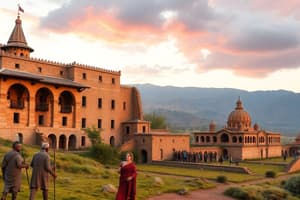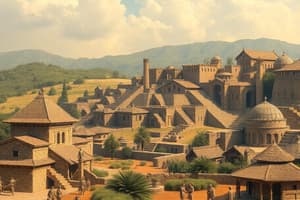Podcast
Questions and Answers
Which period in history is characterized by the emergence of writing and early civilizations?
Which period in history is characterized by the emergence of writing and early civilizations?
- Middle Ages
- Ancient History (correct)
- Prehistoric Era
- Classical Antiquity
What significant change occurred during the Renaissance period?
What significant change occurred during the Renaissance period?
- The establishment of the Roman Empire
- Development of the scientific method (correct)
- Decline of feudalism
- The rise of early human tools
Which concept in history focuses on governance and leadership structures?
Which concept in history focuses on governance and leadership structures?
- Economics
- Conflict and Cooperation
- Culture and Society
- Power and Authority (correct)
Who is known as the 'Father of History'?
Who is known as the 'Father of History'?
Which method of historical analysis involves arranging events in order of occurrence?
Which method of historical analysis involves arranging events in order of occurrence?
During which period did feudalism rise alongside the emergence of Christianity and Islam?
During which period did feudalism rise alongside the emergence of Christianity and Islam?
What was a notable impact of the Industrial Revolution?
What was a notable impact of the Industrial Revolution?
What does historiography focus on in the study of history?
What does historiography focus on in the study of history?
Flashcards are hidden until you start studying
Study Notes
Overview of History
- Study of past events, societies, and civilizations.
- Provides context for understanding the present and future.
- Involves analysis of primary and secondary sources.
Key Periods in History
-
Prehistoric Era
- Time before written records.
- Development of early humans, tools, and agriculture.
-
Ancient History
- Emergence of writing and early civilizations (e.g., Mesopotamia, Egypt, Indus Valley).
- Formation of empires (e.g., Roman Empire, Persian Empire).
-
Classical Antiquity
- Development of philosophy, democracy, and science.
- Key figures: Socrates, Plato, Aristotle.
-
Middle Ages
- Feudalism, the rise of Christianity and Islam.
- The Black Plague and its impact on Europe.
-
Renaissance
- Rebirth of art, culture, and humanism (14th-17th century).
- Scientific advancements and exploration.
-
Modern History
- Industrial Revolution and its social effects.
- World Wars and the Cold War.
Important Concepts
- Historiography: The study of historical writing and methodologies.
- Primary Sources: Original documents (e.g., letters, diaries, artifacts).
- Secondary Sources: Analyses or interpretations of primary sources.
Major Themes in History
- Power and Authority: Examining governance and leadership structures.
- Conflict and Cooperation: Studying wars, treaties, and alliances.
- Culture and Society: Impact of art, religion, and social structures.
- Economics: Trade, resources, and the development of economies.
Notable Historians
- Herodotus: Often called the "Father of History."
- Thucydides: Focused on a more critical, evidence-based approach.
- Leopold von Ranke: Advocated for a rigorous methodology in history.
Methods of Historical Analysis
- Chronology: Arranging events in order of occurrence.
- Comparative History: Analyzing similarities and differences between societies.
- Cultural History: Understanding the influence of culture on historical events.
Importance of History
- Helps develop critical thinking and analytical skills.
- Aids in understanding cultural identities and societal changes.
- Provides lessons from the past to inform future decisions.
Overview of History
- Study of past events, societies, and civilizations to gain insights into contemporary issues.
- Analyzes primary sources (original documents) and secondary sources (interpretations) for a comprehensive understanding.
Key Periods in History
-
Prehistoric Era
- Precedes written records; marked by the evolution of early humans and the advent of agriculture.
-
Ancient History
- Birth of writing and complex societies, notably in Mesopotamia, Egypt, and the Indus Valley.
- Formation of significant empires, including the Roman and Persian Empires.
-
Classical Antiquity
- Flourishing of philosophy, introducing foundational ideas in democracy and science.
- Influential philosophers include Socrates, Plato, and Aristotle.
-
Middle Ages
- Characterized by feudal systems and the spread of Christianity and Islam.
- The Black Plague drastically altered European society and population.
-
Renaissance
- A cultural revival from the 14th to the 17th century, emphasizing humanism and artistic expression.
- Innovations in science and exploration occurred during this period.
-
Modern History
- Marked by the Industrial Revolution, which transformed economies and societies.
- Key global events include the World Wars and the geopolitical tensions of the Cold War.
Important Concepts
-
Historiography
- Focuses on the evolution and methodologies of historical writing.
-
Primary Sources
- Include original documents such as letters, diaries, and artifacts that provide insight into historical context.
-
Secondary Sources
- Comprised of analyses or interpretations based on primary sources, often used for research and education.
Major Themes in History
-
Power and Authority
- Investigates the structures of governance and the dynamics of leadership.
-
Conflict and Cooperation
- Explores instances of warfare, treaties, and alliances between societies.
-
Culture and Society
- Looks at the effects of art, religion, and social structures on both historical and contemporary issues.
-
Economics
- Examines trade, resource management, and the evolution of economic systems throughout history.
Notable Historians
-
Herodotus
- Known as the "Father of History" for his extensive writings on the Greco-Persian Wars.
-
Thucydides
- Critically analyzed history with a focus on evidence-based narratives, particularly of the Peloponnesian War.
-
Leopold von Ranke
- Promoted a methodologically rigorous approach to historical research and writing.
Methods of Historical Analysis
-
Chronology
- Involves the sequencing of historical events to create a coherent timeline.
-
Comparative History
- Focuses on the similarities and differences across different cultures and societies.
-
Cultural History
- Studies the impact of culture on historical developments and events.
Importance of History
- Cultivates critical thinking and analytical skills beneficial in various fields.
- Enhances understanding of cultural identities and the evolution of societal norms.
- Offers lessons from past experiences to guide future decisions and actions.
Studying That Suits You
Use AI to generate personalized quizzes and flashcards to suit your learning preferences.



